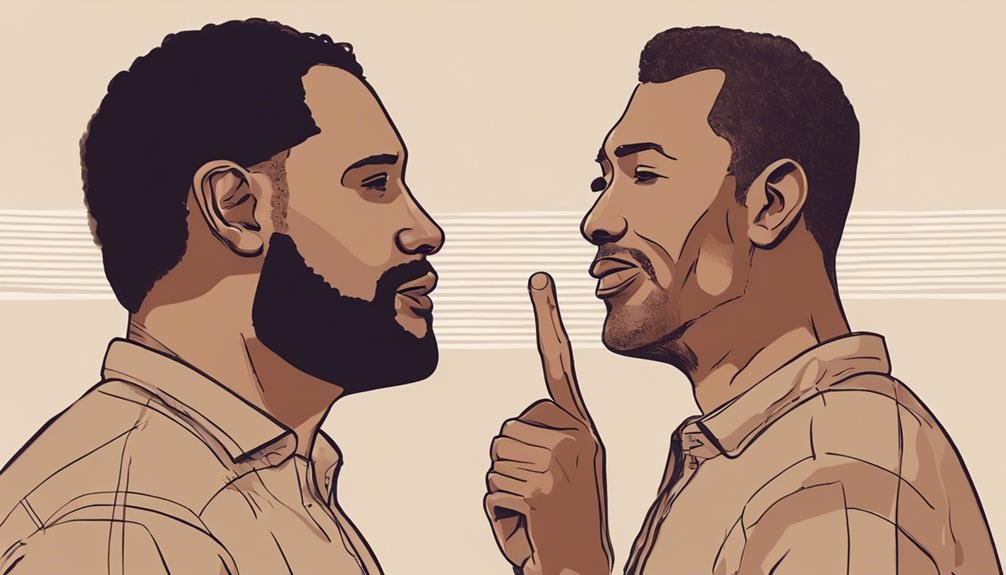
As a man, developing emotional intelligence is key to building strong, lasting relationships. It starts with self-awareness – recognizing your own emotions, values, and motivations. By acknowledging your strengths and weaknesses, you'll better navigate complex social situations and relationships. Effective communication is also crucial, involving clear expression, active listening, and empathy. By challenging traditional masculine norms and being willing to be vulnerable, you can foster deeper connections with others. By mastering emotional intelligence, you'll be able to create a foundation for meaningful friendships and more intimate relationships, and discovering how to do so can be a game-changer.
Key Takeaways
- Developing emotional intelligence is crucial for men to build and maintain strong relationships through self-awareness, empathy, and effective communication.
- Embracing vulnerability and open communication helps men overcome traditional masculine ideals that limit emotional expression and intimacy.
- Active listening, empathy, and validation are essential skills for navigating conflicts and sensitivity in relationships.
- Practicing self-awareness and expressing emotions in a healthy way enables men to create a safe and supportive environment for deeper emotional intimacy.
Understanding Emotional Intelligence Basics

You've likely heard the term 'emotional intelligence' (EI) before, but what does it really mean, and how can it impact your relationships? Emotional intelligence refers to the ability to recognize and understand emotions in yourself and others, and to use this awareness to guide thought and behavior. Developing EI takes time and effort, but it's a crucial investment in your personal growth journey.
The foundation of emotional intelligence is self-awareness discovery – understanding your own emotions, values, and motivations. This involves acknowledging your strengths and weaknesses, and recognizing how your emotions impact your behavior. When you're self-aware, you're better equipped to navigate complex social situations and build stronger relationships.
As you embark on the journey to develop your EI, keep in mind that it's a continuous learning process. It requires reflection, effort, and commitment. However, the payoffs are significant: enhanced relationships, improved communication skills, and increased empathy for others. By prioritizing your emotional intelligence, you'll be better equipped to build and maintain strong relationships that are authentic, rewarding, and fulfilling. The journey may be challenging at times, but the reward is worth it.
Identifying and Managing Emotions
Recognizing and managing your emotions is a critical aspect of emotional intelligence, and it begins with developing a nuanced understanding of the emotional landscape within yourself. To achieve this, you need to cultivate self-awareness, which involves acknowledging and accepting your emotions, rather than suppressing or denying them. By being more aware of your emotions, you can better understand their impact on your thoughts and behaviors.
- Emotional labeling: Recognize and label your emotions, rather than just feeling them. This helps you process and understand your emotions better.
- Emotional awareness: Pay attention to your emotions throughout the day, including the subtle ones that may be lurking beneath the surface.
- Self-reflection: Regularly reflect on your emotions, exploring their causes, effects, and patterns.
- Physiological awareness: Pay attention to the physical sensations associated with your emotions, such as tension, relaxation, or discomfort.
Effective Communication Skills Needed

To build strong relationships, you need to master effective communication skills, which involve more than just speaking your mind.
Developing clear and concise language, practicing active listening techniques, and being aware of nonverbal cues are essential components of effective communication.
Clear and Concise Language
Mastering clear and concise language is crucial for men who want to communicate effectively and avoid misunderstandings that can lead to conflicts in their relationships. When you express yourself clearly, you build trust and foster deeper connections with others.
To achieve this, focus on using simple vocabulary that's easy to understand. Avoid using jargon or overly technical terms that may confuse others.
Effective communication isn't just about conveying information, but also about being considerate of your listener's needs. Consider the following strategies to improve your clear and concise language:
- Avoid ambiguity: Be specific and direct when making requests or expressing thoughts.
- Use concrete examples: Illustrate your points with real-life experiences or anecdotes.
- Break down complex ideas: Divide complicated topics into smaller, manageable parts.
- Practice active expression: Speak clearly and confidently, without filler words (e.g., 'um' or 'ah').
Active Listening Techniques
Having clarified your message through clear and concise language, you can now focus on the other half of the communication equation: ensuring you fully understand the messages others are conveying, which is where active listening techniques play a vital role in effective communication.
To truly hear what others are saying, you need to engage in observational listening, which involves paying attention to both verbal and situational cues. This means maintaining eye contact, asking open-ended questions, and avoiding interrupting the speaker.
Active listening also requires empathetic responding, which involves acknowledging and validating the other person's emotions. By responding in a supportive and non-judgmental manner, you can create a safe space for open and honest communication. When you focus on understanding the other person's perspective, you can build trust, resolve conflicts, and strengthen relationships.
Nonverbal Cues Matter
Your nonverbal cues, including facial expressions, body language, and tone of voice, convey just as much information as your spoken words, and being aware of these cues is essential for effective communication.
As someone who wants to build strong relationships, it's crucial to understand that nonverbal cues can either support or contradict your message. When interacting with others, make an effort to be mindful of your body language, ensuring it's open and engaged. This means maintaining eye contact, uncrossing your arms, and standing up straight.
Interpreting body language and reading facial expressions in others can also help you better understand their emotions and needs.
Here are four key nonverbal cues to pay attention to:
- Eye contact: Avoidance or lack of eye contact can indicate discomfort or dishonesty.
- Crossed arms or legs: This defensive posture may suggest the person is closed off or resistant to your message.
- Facial expressions: A mismatch between verbal and nonverbal cues can be a sign of insincerity or hidden emotions.
Building Stronger Male Friendships
To forge more resilient and meaningful friendships, men must first identify and challenge the societal norms and personal biases that often limit the depth of male relationships. Traditional masculine ideals can prevent men from expressing emotions, vulnerability, and intimacy, which are essential components of fostering trust and deepening bonds in friendships.
You don't have to be held back by these outdated norms. By acknowledging and overcoming these barriers, you can cultivate more substantial and fulfilling friendships.
As you work on building stronger male friendships, focus on active listening, empathy, and open communication. Create opportunities to share your thoughts, feelings, and experiences with others, and be receptive to theirs in return. Be willing to be vulnerable and authentic, and don't be afraid to show your emotions.
Navigating Conflict and Sensitivity

Effectively navigating conflict and sensitivity in male relationships often requires a higher degree of emotional intelligence and communication skills than many men possess. As you strive to build strong relationships, it's essential to recognize that conflict is inevitable, and how you handle it can either strengthen or weaken your bonds.
To navigate conflict and sensitivity effectively, focus on empathy development, which enables you to understand and acknowledge others' emotions. This helps prevent miscommunication and fosters a more constructive dialogue.
- Active listening: Make a genuine effort to hear and understand the other person's perspective, and respond thoughtfully.
- Handle stress constructively: Learn to recognize and manage your stress triggers to prevent emotions from escalating.
- Avoid taking it personally: Focus on the issue at hand, rather than making it a personal attack.
- Practice empathy and validation: Show understanding and acknowledge the other person's emotions, even if you disagree with their perspective.
Improving Romantic Relationships
You're likely no stranger to the challenges of romantic relationships, and you know that keeping the spark alive requires more than just good intentions.
To truly build a strong, lasting connection with your partner, you need to be able to communicate effectively and empathize with their needs and feelings.
Building Emotional Intimacy
By actively engaging in open and honest communication with your partner, you can lay the groundwork for deeper emotional intimacy, thereby fostering a more resilient and fulfilling romantic relationship. This involves expressing vulnerability, which can be a challenging but ultimately rewarding experience for men. By sharing your thoughts, feelings, and desires with your partner, you create a safe space for mutual understanding and connection.
Developing empathy is also crucial in building emotional intimacy. When you actively seek to understand your partner's perspective, you demonstrate that you value and respect their feelings. This, in turn, strengthens your bond and promotes a deeper sense of connection.
Practice self-awareness: Understand your own emotions and needs to effectively communicate with your partner.
Be present in the moment: Engage fully with your partner, putting away distractions and focusing on the conversation.
Use 'I' statements: Express your thoughts and feelings using 'I' statements, rather than 'you' statements that can come across as accusatory.
Show appreciation and gratitude: Regularly express your gratitude for your partner, celebrating the positive aspects of your relationship.
Active Listening Matters
In romantic relationships, mastering the art of active listening can be a game-changer, as it allows partners to truly hear and understand each other, preventing miscommunications and strengthening their bond. You're likely to find that when you actively listen to your partner, they feel seen, heard, and validated, which can lead to deeper emotional connection and intimacy.
To become a better listener, you need to cultivate mindful self-awareness. Be aware of your own thoughts, emotions, and biases that may influence how you interpret your partner's words. Practice emotional expression by acknowledging and validating your partner's feelings. This helps create a safe and supportive space for open communication.
Effective active listening requires focus and attention. Give your undivided attention to your partner, maintaining eye contact and avoiding distractions. Avoid interrupting or dismissing their thoughts, and instead, show genuine interest in their experiences and emotions. By doing so, you'll create a sense of belonging and togetherness, ultimately strengthening your relationship. By incorporating active listening into your daily interactions, you'll be surprised at how it can transform your relationships and bring you closer to your partner.
Conclusion
Developing emotional intelligence is crucial for men to foster deeper, more meaningful connections with others. By mastering emotional awareness, effective communication, and conflict resolution, men can build stronger, longer-lasting relationships.
Consider this: men with high emotional intelligence are twice as likely to have a successful marriage, with a study showing that 71% of men with high emotional intelligence reported being satisfied with their romantic relationships, compared to 35% of those with low emotional intelligence.
